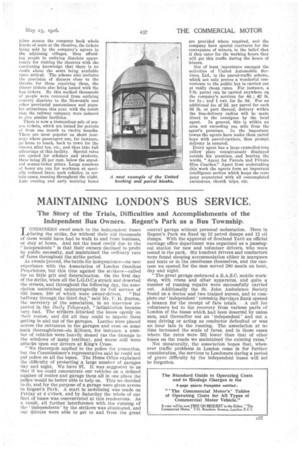The Story of the Trials, Difficulties and Accomplishments of the Independent Bus Owners. Regent's Park as a Bus Township.
Page 11

If you've noticed an error in this article please click here to report it so we can fix it.
MAINTAINING LONDON'S BUS SERVICE.
T0NDONERS owed much to the independent buses 4
during the strike, for without their aid thousands of them would have had to walk to and from business, or stay at home. And not the least credit due to the "independents " is that their owners declined to profit by public necessity, and maintained the ordinary rate of fares throughout the strike period.
As events proved, the battle for independence—no new experience with the Association of London Omnibus Proprietors, but this time against the strikem called for no little grit and determination. On the first day of the strike, when all the L.G.O.C.s struck and deserted the streets, and throughout the following day, the association maintained uninterruptedly its full service of 450 buses, 100 of which were owner-driven. "But halfway through the third day," said Mr. V. H. Burton, the secretary of the association, in an interview reported in the Daily Telegraph, "intimidation became very bad. The strikerS attacked the buses openly on their routes, and did all they could to impede them getting in and out of the garages. Lorries were placed across the entrances to the garages and even on some main thoroughfares—in Kilburn, for instance, a number of vehicles were heavily stoned (as the damage to the windows of many testifies), and worse still were attacks upon our drivers at King's Cross.
"We thereupon applied to the police for protection, but the Commissioner's representative said he could not put polite on all the buses. The Home Office explained the difficulty of protecting a large number of garages day and night. We have 97. It was suggested to us that if we could concentrate our vehicles on a defined number of routes and garage them all in one place the police would be better able to help us. This we decided to do, and for the purpose Of a garage were given access to Regent's Park. A start in mobilizing was made on Friday at 4 o'clock, and by Saturday the whole of our fleet of buses was concentrated at this rendezvous. As a result, all further interference with the running of the 'independents' by the strikers was eliminated, and our drivers were able to get to and from the great
central garage without personal molestation. Here In Regent's Park we fixed up 12 petrol dumps and 12 oil dumps. With the approval of Scotland Yard an official carriage office department was organized as a passingout station for new and volunteer drivers, who were tested in the park. Six hundred drivers and conductors were found sleeping accommodation either in marquees and tents or in the omnibuses themselves, and the canteen we opened for the men served 280 meals an hour, day and night.
"The great garage embraced a R.A.S.C. mobile workshop, with crane and other apparatus, and quite a number of running repairs were successfully carried out. Additionally the St. John Ambulance Society found us a doctor and two trained nurses, and to complete our independent' township Barclays Bank opened a brancn for the receipt of fare totals. A call for volunteers, led to the recovery from various parts of London of the buses which had been deserted by union men, and thereafter not 'independent' and not a man driving or acting as conductor defaulted or was an hour late in the running. The association at no time increased the scale of fares, and in those cases where the rates were 33i lower than that of other buses on the roads we maintained the existing rates."
Not unnaturally, the association hopes that, whenever traffic problems in London come in for further consideration, the services to Londoners during a period of grave difficulty by the independent buses will not be forgotten.


























































